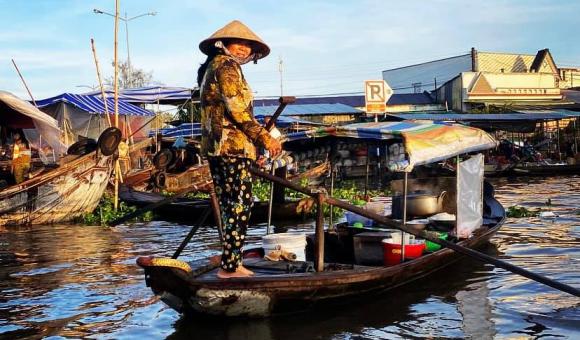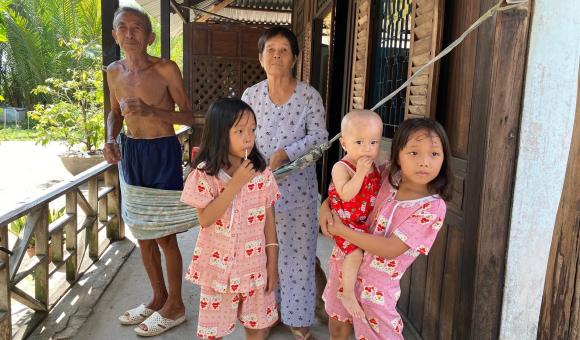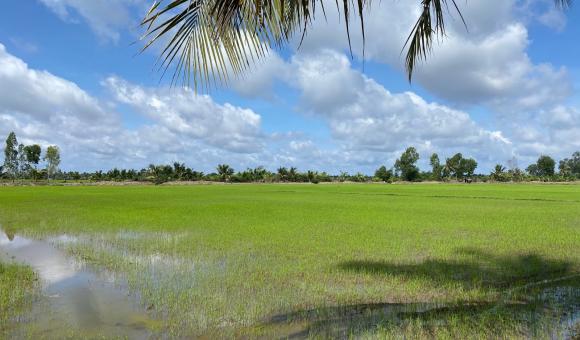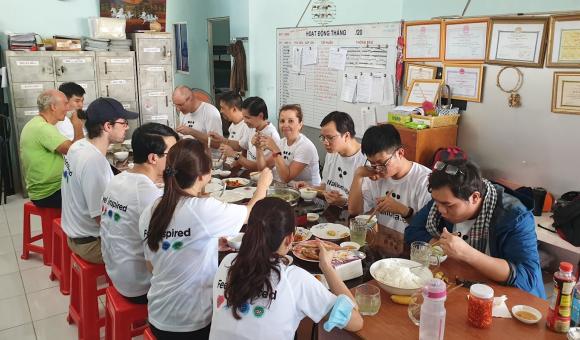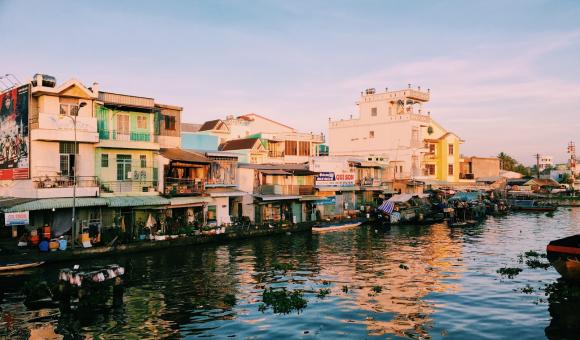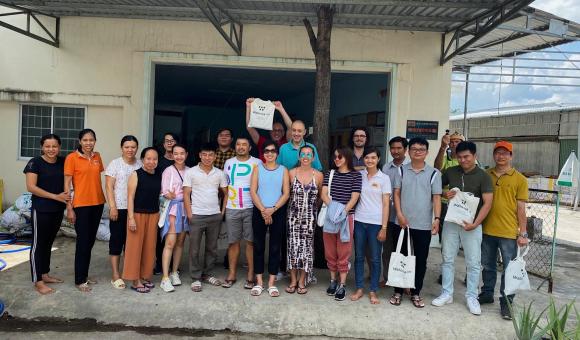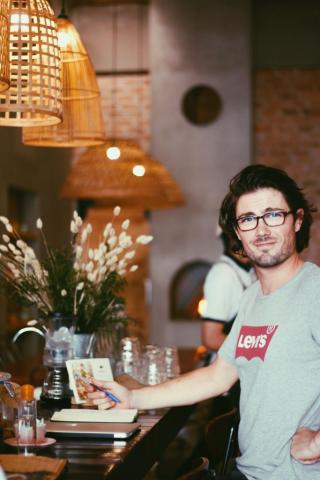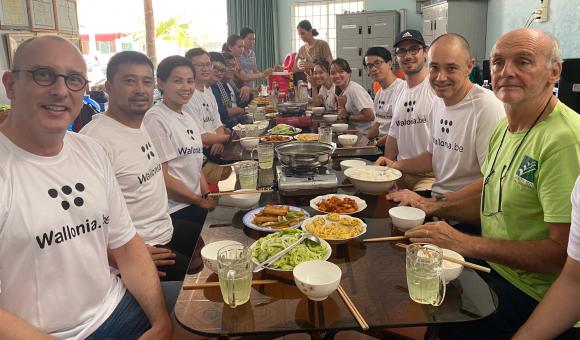
The story of a weekend unlike any other.
On 24 and 25 April 2021, I went to Long My, a small town in Hau Giang province, 200 km south-east of Ho Chi Minh City.
We took part in the "Mekong Bike Delta Tour" organised by the NGO "Mekong Plus", with Eric Bletard, the Wallonia Export-Investment Agency's (AWEX) economic and commercial advisor in Vietnam, and a dozen ambassadors and employees of the Wallonia.be brand. As its name suggests, this was a bicycle tour during which we visited poor families living in the Mekong region. The places we explored are still unspoiled by tourists.
For us westerners used to comfort and easy access to resources and energy, this was an opportunity to get off the beaten track and remember that not everyone on Earth is in the same boat. I can tell you now that this trip, which seemed untouched by time and far removed from our daily lives, had a profound effect on us. We were full of emotion when we returned from a weekend that none of us will ever forget.
Before sharing our experience and describing how and why we were all shaken by what we experienced during these two days, allow me, if you will, to put our adventure into a little context.
The economic crisis in Vietnam: the price to pay for perfect management of the epidemic.
Despite exemplary management of the epidemic since the beginning of 2020, Vietnam has not escaped the economic crisis. Closing its borders to control Covid-19 stopped tourism in its tracks and thus the arrival of foreign travellers.
To understand the impact of this, you should realise that in 2018, Vietnam recorded roughly 15 million entries to its territory, with tourism revenues of almost 30 billion dollars. This is approximately 10 to 12% of the country's GDP. The cities of Da Nang, Nha Trang and even sites adored by travellers such as Phu Quoc Island, Along Bay, the rice fields of Sapa or the city of Hue (former imperial capital between 1802 and 1945), to name but a few, have been deprived of one of their main sources of income.
The large cities of Hanoi and Ho Chi Minh have also been affected by this crisis. When travelling around the country, it is difficult to count the number of hotels, tourist agencies and restaurants that have had to close down due to a lack of customers, resulting in massive job losses and forcing the poorest families in all corners of the country to find alternative ways to create a survival income.
On the other hand, Vietnam is among the countries with the fewest cases of Covid-19 in the world and is also one of the countries that has had the least lockdowns.
However, poverty in Vietnam is not new.
Although since the first decade of this century, some cities and regions have been able to develop and the percentage of poor families has halved in 10 years, from 20% in 2010 to 10% in 2018, in other more remote places, nearly 2% of the population still live below the poverty line.
Of a population of nearly 98 million, approximately 2 million people live on less than €1.5 per day per person, making access to vital resources such as water, food and energy (fuel, electricity, gas...) complicated. The same applies to access to transport and education for children.
AWEX: a long-term commitment to meeting international sustainable development goals.
AWEX (Walloon Export-Investment Agency), which is responsible for the development and management of Wallonia's international economic relations, has made a long-term commitment to its "Corporate Social Responsibility" (CSR) through the implementation of the "17 Sustainable Development Goals" (SDGs) among its employees and within exporting companies.
In these difficult times, the Wallonia.be brand, represented in South-East Asia (Vietnam, Laos, Cambodia) by economic and commercial advisor Eric Bletard, wanted to support the "Mekong Plus" NGO, managed by Bernard Kervyn, by organising a cycling weekend for its employees and ambassadors: "The Mekong Bike Delta Tour".
You will understand from this article, written in an "I tested it for you" style, that it was in fact much more than just a cycling weekend.
But before that, let me continue to set the context by introducing you to the "Mekong Plus" NGO.
"Mekong Plus": committed to raising as many families as possible out of extreme poverty in Vietnam and Cambodia.
Since the beginning of the 1990s, Bernard Kervyn has been using his experience and energy to help disadvantaged populations to enjoy a fairer, more sustainable way of life.
Today, he is the coordinator of the various projects of the "Mekong Plus" NGO, which has already helped to raise nearly 200,000 people out of extreme poverty in Vietnam and Cambodia.
To achieve its mission, the organisation works on six different pillars:
- education
- health & hygiene
- construction of small infrastructures
- employment
- agriculture
- microcredit
The NGO lives (survives) on donations, income from its shops and the organisation of short trips.
To ensure it can operate properly, the association relies each year on donations from individuals and partner companies, as well as on the sale of products manufactured by Vietnamese families. (You will discover an example of these products later on). It also organises short stays for tourists, during which travellers are taken into the field to see the actions and projects implemented by the association's teams and partners.
Needless to say, the NGO has also been affected by the pandemic.
It has seen its income drop significantly (if not disappear) since the beginning of the economic crisis linked to the virus and the absence of tourists.
The Mekong Bike Delta Tour
The trips organised by the association, such as the one we were lucky enough to take part in, are far from simple tourist products. For example, when you pay an amount in Vietnam Dong to participate, 50% of the money collected goes directly to the organisation to contribute to the donation fund. The remaining 50% is spent on organising the trip: hotel, food, travel, excursions... and thus contributes to the local economy.
By participating in this kind of programme, you raise your awareness about issues related to extreme poverty, you directly meet the people affected and you actively contribute to the development of the NGO's projects.
This is an excellent alternative to "as usual" tourism, whose main goal is economic growth and profit, often to the detriment of local populations, and whose benefits are concentrated around a small group of individuals.
Before departure
Two weeks before departure, we received the programme for the weekend by email.
We could see the activities in which we were going to participate, as well as the three objectives of this stay:
- immersion in the lush greenery of southern Vietnam
- tasting local dishes
- discovering local life and understanding the Mekong Plus project
Day 1: Saturday, 24 April
7 am - Ho Chi Minh City
I had an appointment at the AWEX headquarters in Ho Chi Minh City to join the group before getting into our minivan.
We headed to Hau Giang, which is 200 km south-east of Ho Chi Minh.
A 2000's Mercedes-Sprinter took us on the 4.5-hour drive to our hotel in Long My.
It is small town and home of the "Anh Duong Center", an entity of the "Mekong Plus" project, whose team would take care of us throughout the weekend.
Once we arrived at our destination, after a long journey on the Vietnamese national highways, we left our backpacks at the hotel before going to the centre for lunch.
12 pm - Long My - Anh Duong Center
We were welcomed by the team of the partner centre of "Mekong Plus", which has been working for nearly 17 years to help the poorest and most unfortunate to get out of poverty through microcredits, training programmes and employment assistance as well as the granting of education scholarships and the development of transport and travel infrastructure (bridges, roads, highways, etc.).
After hours of talking about family, Vietnam and business during the journey, we could only think of one thing: eating.
It was time to regain our strength before starting the three hours of cycling under a blazing sun that awaited us.
1.30 pm - Choice of bamboo bikes
Our bikes were waiting for us when we left the table.
Over the past ten years, these two-wheelers and helmets made of bamboo have become the centre's brand image.
We checked the brakes, put on a helmet and get in the saddle.
That afternoon we visited several families.
3 pm - Eel farming
One of our afternoon stops took us to visit a family that farms eels.
At the back of the house, we discovered a pond filled with these aquatic snakes, enjoyed here for their delicate flesh and mainly sold on the small local markets.
The centre's objective with this family of farmers is to provide them with the micro-credit they need to buy elvers (baby eels) so that they can raise them and resell the adult animals to make a profit, repay their debt and become financially independent in the long term; or even expand the farm and then appeal to the banks to continue their investments with real credit.
The centre does not abandon the family once it has become independent. It continues to provide support and follow-up to prevent a possible relapse. However, this happens very rarely.
We had been cycling in the heat for almost two hours amongst the canals, orchards and rice fields that characterise the Mekong region. We were then invited to the inhabitants' table, in the courtyard in front of the house, to regain our strength with fresh fruit and water.
It was jackfruit season and the beginning of mango season. Everyone fell upon these delicious, naturally sweet treats.
Shortly before this break, huge clouds had begun to cover the sky. We could feel the rain coming on fast. Indeed, tropical rain (it is currently the start of the rainy season in the region) fell on the entire south while we were enjoying our break. We were in the middle of a cloud mass that covered hundreds of square miles.
Luckily, we were under cover, but there were still 10 km to go and not many people wanted to do it in the pouring rain.
It must be said that in Vietnam when it rains, it really rains. And they were big drops... In Europe, we say that when it rains hard it doesn't rain for long. Well, not in Vietnam! So we inevitably extended the break until it slowed, taking advantage of this time to chat to each other and exchange anecdotes about travel, family, business and other less formal topics.
It never stopped raining, but at the first lull, we put on our rain coats and set off again on our bamboo bikes.
5 pm - Pigs: the kings of the circular economy
The second event of the afternoon was a visit to a house that produces its own biogas (methane) thanks to an ingenious system that is as old as time.
In the backyard of this modest house, under the farm housing a dozen pigs, is hidden a septic tank that collects the animals' excrement.
A fermentation system means that gases are produced and transported to a reserve, a sort of giant plastic bladder that can store enough of this natural resource for the family's needs.
The energy resource is then directed to the stove.
These residents no longer need to purchase expensive industrial gas cylinders.
The most impressive things about this are the low cost and the ease of installation, as it does not require any major resources or complex materials. We were all amazed at this rudimentary ingenuity.
Although some of us, admittedly, would not be willing to live with pigs just a few feet from our kitchen, pigs that are raised then sold for their meat and are the main source of income for the household. It is concrete example of a micro circular economy.
5.30 pm - Return to the hotel after 20 km of cycling under a blazing sun then under a "drache".
(Drache: a word from the Walloon dialect, sometimes used in northern France, which means a downpour).
"I drache toudis ichi éddin" is translated as "it rains all the time here"
Everyone was soaked from head to foot once we got back to the hotel.
We returned to our rooms, dried our clothes and enjoyed a hot shower to invigorate ourselves before heading to the Anh Duong centre to share the evening meal.
6.30 pm - A much awaited and well deserved meal
After our second local meal of the day, once night fell, a few people who still had some energy left went for a walk in the area around the hotel to get some fresh air or a drink, or to buy some souvenirs.
As for the rest of the group, that is to say the vast majority, we were content to drift off to sleep.
Before going to sleep, we set our alarm clocks for 5 am the next morning. We left at dawn the next day to discover a floating market, before having breakfast and getting back on our bikes to continue our escapade.
Day 2: Sunday 25 April
5 am - Difficult to wake up and head for Nga Nam and its ancient floating market
We met in the hotel lobby at 5.30 to take to the road in the minivan. We slowly emerged from sleep as loudspeakers on every corner played communist songs and Vietnamese music.
Thirty minutes later, we arrived in Nga Nam.
As we left the Mercedes Sprinter, we watched some locals doing their morning exercises before going to work.
When we arrived at the site of the visit, after crossing a small stone bridge, the market was just getting ready and activity was in full swing. Bernard explained that the market has become three times smaller since the beginning of the economic crisis that hit the country due to Covid-19. It was therefore quieter than usual.
Despite this, we were able to observe how they operate and how they exchange bags of food resources from boat to boat. One could almost call this place our local "Rungis" market. In any case, despite its much more modest infrastructure, this place has the same function.
The goods are then transported to other small local markets or sold through other trade channels. The sun rose, revealing magnificent colours. Photographers call this moment the "Golden Hour".
We were wearing fluorescent orange life jackets, which were not very discreet but group safety was essential. We boarded wooden boats, with a Vietnamese woman at the helm, to take a tour of the canal and observe the boats filled with food resources.
Each boat had its own speciality: one for cabbage, another for flowers, another for watermelons or meat...
It was crazy to see how they were organised. And above all to realise the gap between our lives and theirs. It almost felt like being on another planet.
6.30 am - Breakfast at the market
After our boat ride, we all sat together around several three-legged wooden tables to enjoy Pho's (rice noodle bowl) and rice cakes, which are national culinary specialities.
We took a few pictures before heading back to the minivan to get our bikes and start our second and last cycling expedition of the weekend.
8 am Saddle up!
We took to the road again to visit a family whose women work at creating papier-mâché objects. These manufactured pieces are usually sold in the various shops of "Mekong Quilts", the commercial branch of the NGO. But they have had to close due to lack of tourists.
When we arrived, the women were preparing an order of Christmas ornaments that would be used to decorate the house of a Vietnamese family at the end of the year.
Thanks to this work, the home we visited has been able to double its income and live much more comfortably.
However, there is no room for all the women in the village to occupy this kind of position. To avoid jealousy among the other villagers, the profits made from the sale of the products are redistributed within the community and used to develop projects that are useful to everyone or to help particular cases in need.
The ferry-boat
The most fascinating experience here was without a doubt the ferry-boat we took to cross the canal to reach this house.
A small raft made of wood and bamboo with a small engine capable of carrying a dozen people on a scooter or bicycle helped us cross the river.
Without this boat, the locals would have to travel many miles before finding a bridge to reach the other side of the river.
9.30 am A scholarship for a young Vietnamese child who dreams of becoming a chemist
We continued our journey by crossing another river, once again with the help of a ferry.
We visited a family to which the Anh Duong Centre had granted a school scholarship.
We were greeted with smiles by the inhabitants: a son and his father who live in a hut surrounded by cultivated land, a pond for farming fish and a few ducklings to be sold for their meat once they are adults.
The members of the centre introduced us to the family and we talked with the little boy via an interpreter. He explained that he was crazy about badminton (a sport adored by the Vietnamese), and that he dreamt of being a chemist.
That day, his father was present. But that was not normally the case. The reason is that the economic crisis has taken its toll on his job. The head of the family usually works in the construction sector in Ho Chi Minh, but at the moment most of the construction sites have been shut down, so he has no more work.
10.30 am "Life will put stones on your path. It's up to you to decide whether to build a wall or a bridge", Coluche
We continued our second day to a house whose only access is by boat across a small river.
The team of the Anh Duong centre took advantage of this visit to show us the concrete road they built at the request of the local community. These road improvements are important in that they facilitate transport and therefore trade and thus families' income.
In total, the NGO has helped finance ⅔ to ¾ of 255 bridges and 165 km of concrete roads.
For a total cost of €600, the bridges allow at least 1,000 crossings per day. They facilitate travel as well as trade and therefore influence household income since, like the concrete roads, they facilitate the transport of goods.
After crossing the small river by boat, we met a family who received a microcredit to improve the quality of their house.
Generally, the roofs are made of very thin, light and cheap iron sheets. The problem is that in the heat the house becomes an oven and on rainy days the noise caused by the thick drops falling on the iron is infernal.
The association allowed them to invest in plates made of recycled plastic materials from plastic waste collected in the canals.
This technology costs two to three times more but provides real comfort to the family compared to the cheap materials mentioned above.
During this last visit, I was struck by the joy and the deep, sincere and human smiles of the children and the head of the family.
After about twenty minutes of discussions with our hosts, we went back to the other side of the river in small groups of two or three people on the small blue boat that had brought us there, returned to the road where we had left our bikes and cycled back to the centre to have a last Vietnamese meal.
12.30 pm A last meal before heading back to Saigon.
During this last meal, we discussed our experiences. These long bike rides had exhausted us but we left the centre with our heads full of memories.
After the final group photo, we took our seats in the minivan and held our hands out of the window to wave goodbye to the centre's team.
